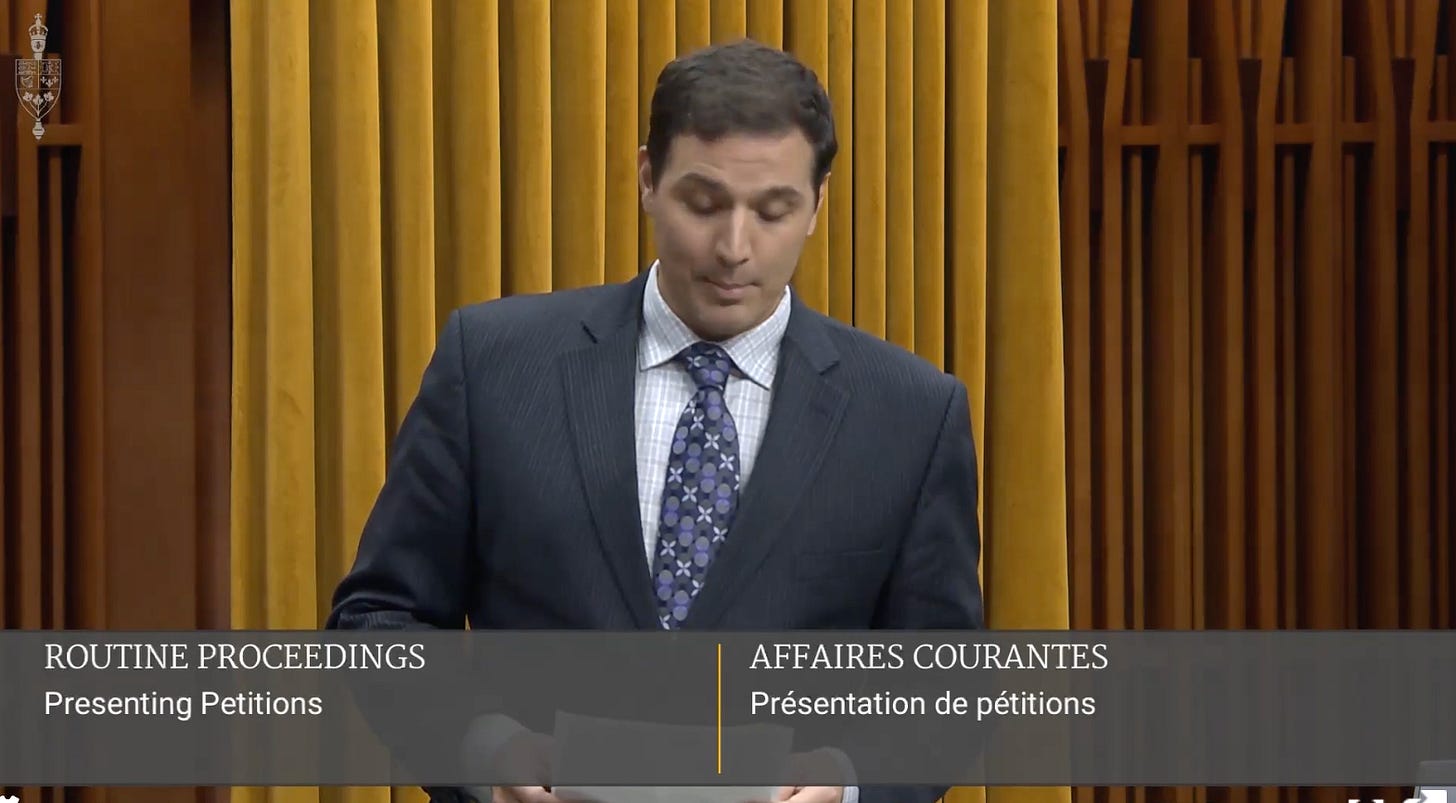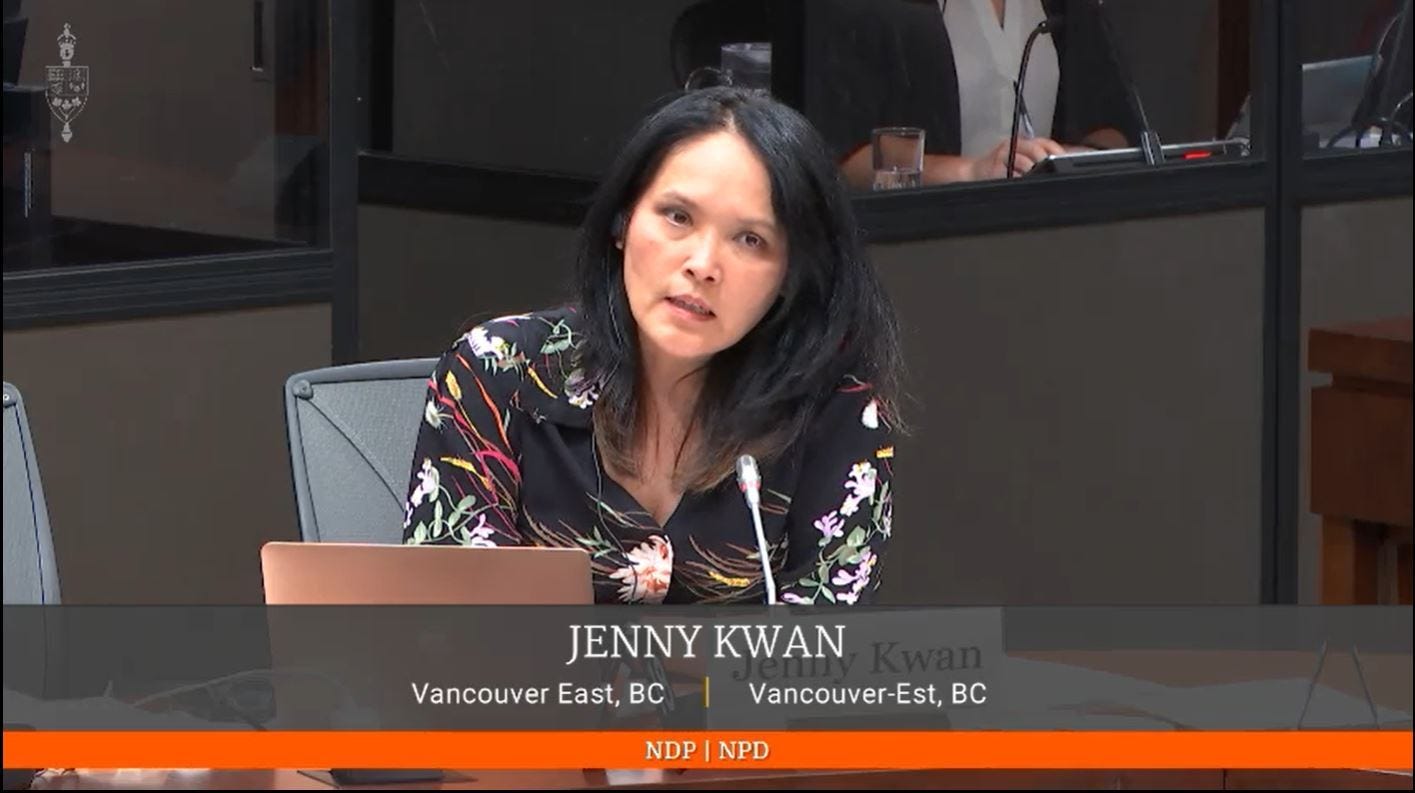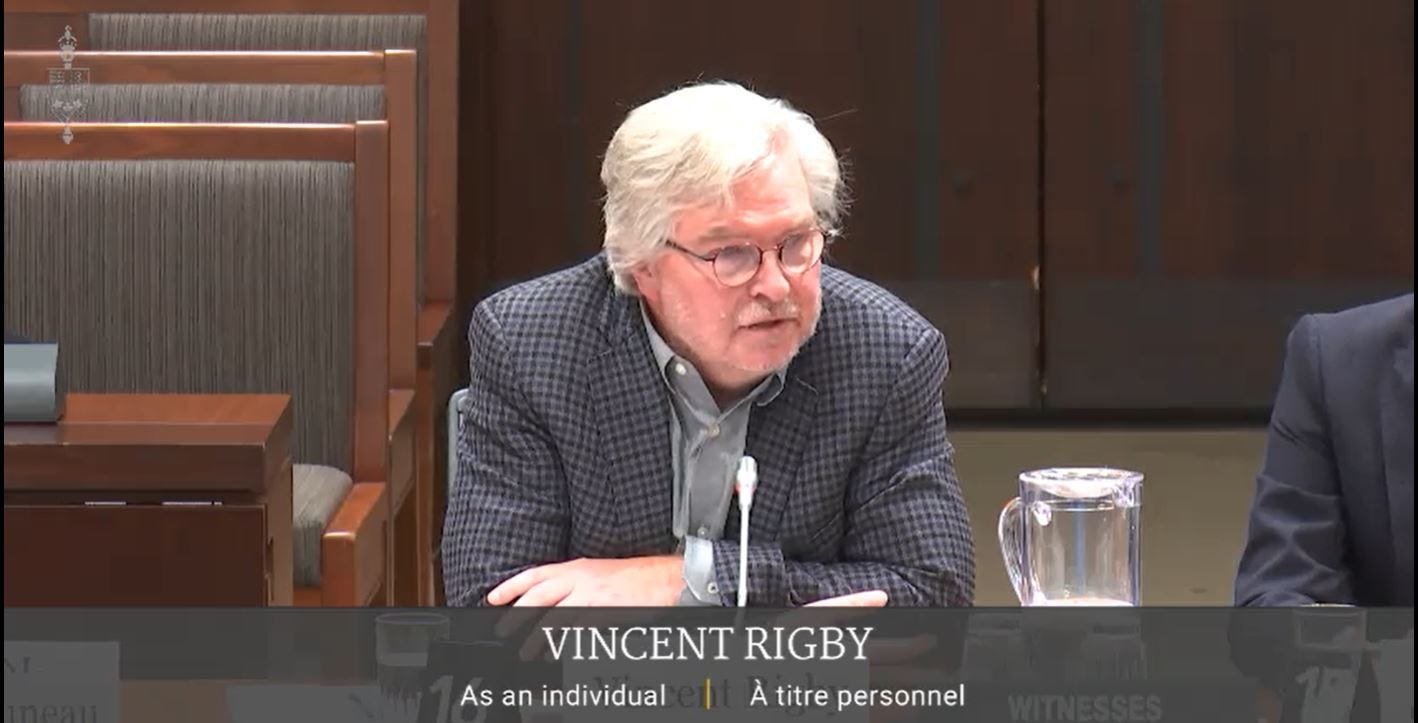Special edition: Sanction talk resurfaces in Canada’s Parliament
And U.S.-Canada relations have muddied the waters for China watchers in Ottawa
Dear China watchers, thank you for tuning in. Today’s newsletter is another Canada-centric edition. As always, tips and feedback are welcome. If you like what we do here, remember to subscribe and share with a few friends/co-workers.
First, we take a closer look at an eye-catching question from MPs on the Hill (sanction is the keyword.) Then we hear from three Canadian pundits on how they think the middle power (or the minor power as they call it) should navigate the intricate China-U.S.-Canada relationship.
MP Damien Kurek (Alberta, Conservative), a member of the Inter-Parliamentary Alliance on China (IPAC), presented a petition asking the Canadian government to formally label China's persecution of Uyghurs a genocide and implement sanctions against Chinese individuals responsible for the human rights abuse of the Uyghur people:
Kurek: “Specifically, the petition that I once again have the honour to table in the House today draws the attention of this place to the genocide taking place against the Uighur people in the People's Republic of China. Without going into too much of the preamble, the petitioners call on the House of Commons to take the following actions to address this very important situation: One, formally recognize that Uighurs in China have been and are being subject to genocide; and two, use the Justice for Victims of Corrupt Foreign Officials Act, known as the Magnitsky act, to sanction those who are responsible for the heinous crimes being committed against the Uighur people.”
*Magnitsky legislation refers to laws authorizing governmental sanctions against foreign nationals responsible for gross violations of internationally recognized human rights.
If you are new to the Canada-China relations space, Prime Minister Justin Trudeau and his Cabinet abstained from a parliamentary vote declaring China is committing genocide against the Uyghurs in the western Xinjiang region. There’s no indication that Trudeau and his cabinet would change their stance on the matter. In stark contrast to his stance on the Uyghur issue, Trudeau had no problem publically condemning Moscow, saying it was "absolutely right" for people to describe Russia's actions in Ukraine as genocide.
Back to the petition: It was first brought up by MP Ed Fast (British Columbia, Conservative) in September 2020. Since then, the petition has been raised multiple times, the last being in February this year. You can see who raised the petition and when here.
Most recently, the sanction talk resurfaced at last week’s meeting of the parliamentary committee on Canada–China Relations, when MP Jenny Kwan (British Columbia, NDP) asked the invited witnesses to talk more about imposing sanctions.
It’s worth noting the word “sanction(s)” appeared 24 times at the meeting—to put things in perspective, “Indo-Pacific” was mentioned 33 times—and all invited experts spoke in support of it.
One caveat, however, is that Canada has gained a bad reputation when it comes to actually imposing sanctions. Punitive measures are also only one of many tools to deter the CCP’s persecution of minorities, according to the experts.
Here’s how the conversation went:
Kwan: “Mr. Miller, in his presentation, talked a little bit about sanctions and imposing them. Canada, of course, has been very reluctant, very slow. … So my question to all the panellists is this, should Canada, in fact, embark on sanctions? And if so, what measures should we undertake and what do you think the repercussions would be? Why is Canada so afraid to take action?”
To which Jonathan Miller, director and senior fellow at Canadian think tank Macdonald-Laurier Institute, responded:
“Absolutely. I think Canada should look very seriously at this. I think that should be taken from a targeted approach. So I think we should be looking specifically at targeted individuals that we can identify, that we feel would be most impactful.
“But I don't think that we should be scared of this. I think that this is something, if we judge our foreign policy actions and our decisions based on how Beijing will react and how Beijing may coerce us, that's not a way to make those decisions. So I absolutely think that there's a precedent, a possibility. Other countries have taken these measures and have had serious discussions on this as well. So we're not alone on this.”
Vincent Rigby, visiting professor at McGill University and senior adviser with the Center for Strategic and International Studies (CSIS), alluded to the limited effect potential sanctions might yield.
“I would endorse that, that view. And we impose sanctions on other countries in similar circumstances. So why would we have an exception for China?
“But again, it's one tool, and we have a whole toolbox, lots of different kinds of things that we can do with respect to China, both internationally and domestically. So we have to keep that in mind. And while I'm a big fan of sanctions in certain circumstances, I think we need to look at what the ultimate outcome is going to be and what results we're going to get from those sanctions and keep our expectations, I think, in the right ballpark.”
Another really good point Rigby made is on the timing of the potential sanctions.
“Given the circumstances of the last couple of years, there may have been reasons why we approach China a certain way, but I think to a considerable extent those circumstances are no longer in place with respect to the two Michaels and others.”
Dr. Thomas Juneau, associate professor at the University of Ottawa, pointed out the likelihood of Canada not being taken seriously even if it was to impose those sanctions. And here’s why, according to him.
“I would answer yes, absolutely. But with a massive ‘but’ and this is something that we saw clearly in the debate on sanctions against Iran in the last couple of weeks. Our ability or capacity to monitor and enforce sanctions in this country is massively overstretched. And Canada has a reputation among its allies, but also among the bad guys, as not being good at enforcing sanctions. We declare them and we don't follow up. And at some point, that's damaging because it signals to the bad guys that when we impose sanctions, we don't follow up. We don't enforce them. So yes, but there is a major need to significantly increase the resources for our sanctions capacity …. I think there's a big gap between what we say and what we do.”
That’s pretty much all things sanction related. We think it’s a topic that’s probably not going to die down soon and we will keep monitoring this space.
If you enjoy what we do, please take a moment to share this link with a few coworkers and help us reach a greater audience.
Spotted: Controversial Senator Yuen Pau Woo, with a growing record of Beijing-friendly positions, gave opening remarks at a foreign policy conference held Monday at Carleton University, home to one of the oldest global affairs schools in Canada.
Woo has made headlines for his whataboutism comments on human rights abuses against Uyghur Muslims in China, a frequent distortion tactic used by the CCP. The independent senator also received criticism from a former diplomat, among others, for his tweet celebrating the return of the two Michaels and Meng Wanzhou, citing an op-ed claiming Meng was taken hostage by Canada and the U.S.. He also urged Canadians to “reflect on lessons learned” from the affair.
Now back to the conference. In his remarks, Woo criticized the scope of Canada’s Indo-Pacific strategy and its emphasis on political and security issues over trade, investment and economic cooperation.



“The most glaring omission in many discussions about Indo-Pacific strategies to date is in the treatment of the largest and most important economy in the region, which is of course China. Any Indo-Pacific strategy which does not put China at the center of prospects for the future prosperity of the region, or which frames China as the reason for a geo-strategic concept such as the Indo-Pacific, is in effect a strategy of containment against China. Conversely, a strategy that properly addresses the challenge of the PRC as an increasingly authoritarian and coercive power in the region, in the context of great power competition with the United States, does not need the Indo-Pacific as an analytic frame.”
The full speech is on his website.
The conference, titled Hard Talk: Canada and the Asian Pacific, was touted as a one-day event that claims to “bring together a diversity of voices seeking an independent foreign policy for Canada.”
We’re only highlighting one roundtable regarding Canada’s widely-anticipated Indo-Pacific strategy. It’s titled: “The ‘Indo-Pacific Strategy’ Is this just part of the U.S. agenda for further encircling China? Whatever happened to the Asia Pacific?”
The discussion revolved around two main ideas:
Mirroring the United State’s foreign policy towards China has dangerous consequences, particularly for Canada’s economy. In fact, Canada should probably consider becoming less reliant on the U.S. economically and security-wise.
Developing an independent foreign policy requires putting Canada’s national interest first and learning from other middle powers.
The panellists pointed out Canada’s diminished political status on the global stage, which was mentioned at the Canada-China parliamentary committee last week. They all but said that Canada is the U.S. lap dog, an argument that former Canadian ambassador to Beijing Guy Saint-Jacques said was common in CCP circles.
Worth noting about this conference:
The sponsors: Two Canadian universities (Carelton and Victoria), the Canadian Foreign Policy Journal and the Canadian Foreign Policy Institute.
The three panellists:
Margaret Cornish: A former Canadian foreign service officer with postings in Beijing, the UN, and the EU. She served as the executive director of the Canada China Business Council and was on Justin Trudeau’s International Advisory Council in 2015 before Trudeau was elected as prime minister. She is now an advisor at the Institute for Peace & Diplomacy.
Carlo Dade: Director of the Trade and Investment Centre at the Canada West Foundation. He’s an expert on Canada-China relations with a focus on agricultural trade.
Stuart Trew: Senior researcher with Canadian think tank CCPA and director of its Trade and Investment research project.
Taking on the moderator role is David Carment, professor at Carleton University’s School of International Affairs and fellow at the Canadian Global Affairs Institute, an Ottawa-based think tank.
The U.S.-is-not-always-our-friend argument is getting nods
Cornish argued that parroting the United State’s points of view on the Indo-Pacific region undermines Canada’s relationship with the rest of Asia. Making matters more complicated is the Canadian people’s insufficient knowledge of the region, particularly China and East Asia.
“[Canada is] attaching ourselves to a fight without any domestic discussion of it,” she said.
Cornish said it would be a “multi-decade effort” to acquire the knowledge needed for developing an independent opinion of the region. She also downplayed Canada’s middle-power status.
“[Canada is] not really welcome. And we're not seen as the middle power that we think we are … We’re a minor power with respect to the United States and with respect to China. But we’re potentially a middle power in multilateral institutions and in other regions.”
The panellists agreed that Canada’s relationship with the U.S. and China is an intricate balancing act. For one, Canada needs to be careful of relying too much on the U.S., which is already happening in sectors such as trade and security.
While the ship might have sailed on Canada's dependence on the U.S. in terms of security, said Trew, Canadians should be skeptical of their leadership’s support for Biden’s “anti-China sentiment.”
Although Canada and the U.S. are regarded as close friends, the two countries were not always aligned on China-related policies, said Dade. For example, Ottawa didn’t follow through with Washington’s grain embargo on the Asian superpower in the 1950s. (Although he said that was because Canada was opposed to its southern neighbour’s domination of the global grain market through subsidies.)
Even now, he said, the U.S. is not always on Canada’s side. He pointed to the new clause within the updated NAFTA agreement that forbids participating countries from trading with “non-market” countries such as China. The clause was seen as a way for the Trump administration to pressure Ottawa.
From Dade:
“Managing this [U.S.-Canada-China] tension has been Canada's albatross. We have the benefit of having this wonderful market: the fattest, richest, easiest market on the planet right next door to us. We've grown fat, and we've gotten rich off of access to that market. But at the same time, the attachment has caused us problems elsewhere, and has prevented us from realizing economic opportunity elsewhere.”
“In terms of dealing with China, the Indo-Pacific strategy is seen by many as a way to avoid dealing with China. But as I hear time and time again, talking with producers on the ground out in Western Canada, there's a realization that even if you run away from China, you're just going to run into China.”
Some Indo-Pacific allies Canada should learn from, according to Cornish:
Singapore: She describes Singapore as subtle, cunning and clever in its ability to maintain positive relations with both the U.S. and China. She said Canada could learn from the Asian republic to “never badmouth anybody.” There’s also an advantage to learning from Singapore because the two countries have a big Chinese diaspora.
South Korea: Cornish said the tech powerhouse is “very focused” on its national interest but has been caught in the crossfire of China-U.S. geopolitical tensions. Cornish said Canada should learn from that and be much more careful handling the Canada-China-U.S. “crisis.” Cornish suggested that Canada should tell the Chinese government that retaliation against individual Canadians won’t yield positive progress for China.
Alright, my fellow China watchers. That’s a wrap. If this was forwarded to you, remember to plug in your email and subscribe.
Have a good evening.









